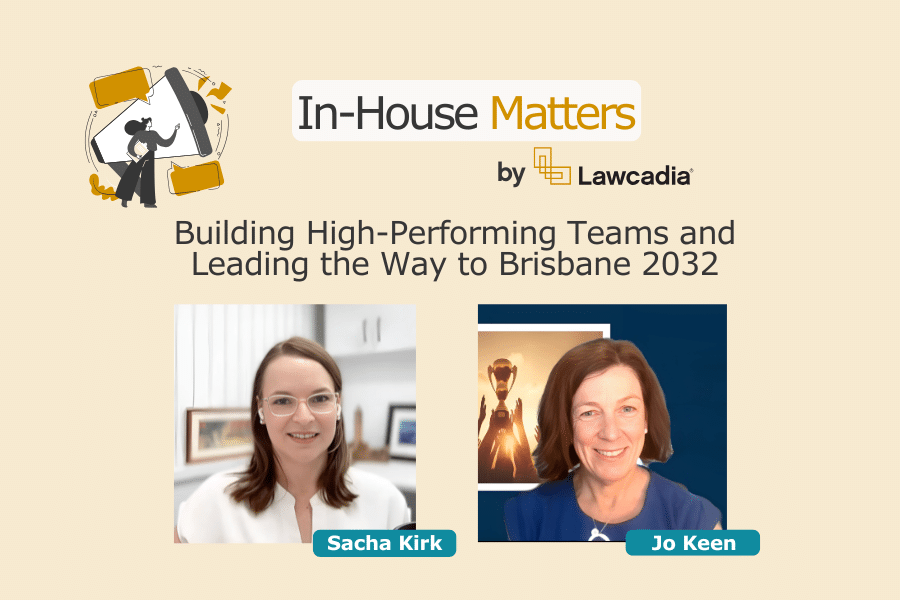What separates good teams from truly high-performing ones? For Jo Keen, former Interim Executive Manager of Corporate Services at the Games Independent Infrastructure and Coordination Authority (GIICA), the answer lies not in individual talent alone, but in culture, leadership, and purpose.
In our recent In-House Matters webinar, Lawcadia’s CMO, Sacha Kirk, spoke with Jo about what in-house leaders can learn from elite sport, how culture sustains performance under pressure, and why collaboration is key to delivering the Brisbane 2032 Olympic and Paralympic Games.
Culture as the Defining Factor
Elite teams succeed not just because of skill, but because of culture. “If we have a look at what actually makes a sporting team perform at the highest level consistently year upon year, those lessons… we can carry them into our workplaces,” Jo explained.
Research underscores the point. “When we actually focus on culture, we’re going to be over 70% more engaged at work… it’s 49% likely that they’re not going to be injured at work… their performance is going to increase by 20%… and they’re actually going to be 43% more productive.”
“Actually, focusing on culture has to be something that has to be a number one priority for all of us.”
As Jo put it, “Sometimes we focus on the results without actually having a look at what the individual needs in order to thrive and be at their best… if we get those things right, performance will be the outcome.”
Leadership as Service
For Jo, leadership is never about title. “Leadership is not about position or title, it’s about service to others,” she said. “We all have the capacity to lead because leading is about creating a culture where there is a deep sense of belonging… and that we consistently support one another to be our best.”
That means leaders must also protect and enable their people. “If there’s a bullet coming towards me, it hits me, not the team,” Jo explained. “When there’s great work, we’re pushing the team into the limelight. The leader shouldn’t be seen at all.”
Purpose and Values in Action
Shared purpose is another hallmark of high-performing teams. “We all have that deep desire to be part of something bigger than ourselves,” Jo reflected, referencing the story of a NASA janitor who described his job as “putting a man on the moon.”
Living values daily is equally critical. “Who are we going to be when the times actually get really, really tough? Now it’s really integral for a leader to actually live and breathe those values each day and lead by example,” she said.
Simple acts, like handwritten notes or team mascots, can make a big difference. “It’s recognising those small wins… thanking them for the work that they do… or for living and breathing the values.”
Playing to Strengths and Building Resilience
Just as athletes thrive in positions suited to their natural abilities, workplace teams excel when individuals play to their strengths. Using a netball analogy, Jo explains, “If you’re quick and agile, you’re going to shine as a centre. If you’re tall with a long reach, you’ll thrive as a goalkeeper or goal shooter. We both need each other in order to excel.”
Resilience also requires rest and recovery. “Athletes can’t perform at the highest level if they don’t have that time to rest and recover. So it’s really about managing your energy, not your time,” Jo said. “I don’t send emails on weekends… or I put things on delayed send so the team can rest.”
From Adversarial to Collaborative
Looking ahead to Brisbane 2032, Jo emphasised the need for a new approach to infrastructure delivery. “Once upon a time we really came from a model that was quite adversarial… but how do we take more of a collaborative, innovative approach?” she asked.
With GIICA delivering 17 venues within the next seven years, with a hard deadline, Jo explains that we need to shift away from adversarial models to collaboration, trust and cooperation, with openness and transparency, where risk is actually shared.
Defining Success and Legacy
For Jo, the success of Brisbane 2032 will be measured in more than medals. “Firstly, I want to make sure that we have set up the Games and the Paralympic Games so athletes can be at their very, very best”. Jo also holds dear the importance of athletes reflecting on their experiences after the Games. They should realise that the achievements they’ve made are just one aspect of their identity and have the opportunity to build upon their sporting career.
Beyond the athletes, inclusivity and community impact are central. “From a spectator perspective, that the Games are accessible and inclusive so that everyone has the ability to go and watch,” she said. “We’re creating venues across Queensland that will enable grassroots sport, connect communities, and really demonstrate what an inclusive, sustainable society is for the world.”
As Joanne concluded, “It’s now time to get excited. It’s seven years away and it’s really going to be a time of real transformation for our city and our state, and for our community.”
Lessons for In-House Leaders
While the scale of the Olympics is unique, the lessons translate directly for in-house legal and corporate leaders:
- Prioritise culture, especially in tough times.
- Lead as service, not status.
- Align individuals with purpose and values.
- Encourage collaboration and trust over adversarial mindsets.
- Balance short-term delivery with long-term vision.
This article was originally published on our sister site lawcadia.com.

